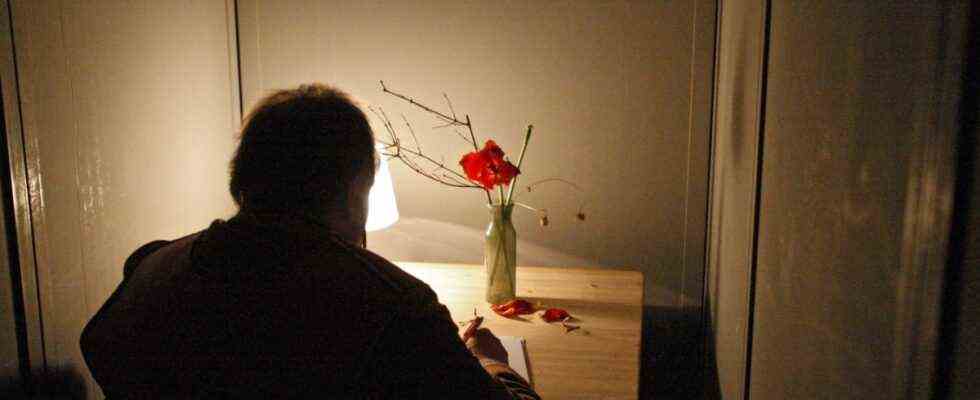“Today is a good day.” This sentence is the first thing Johann-Peter B. (name changed) says into the microphone of the laptop that his supervisor from the Social Psychiatric Services Ebersberg has set up in front of him. The development of the corona numbers suggests a virtual meeting – it is precisely people like B. who suffer particularly from the contact restrictions. “People are getting more and more dogged,” says the 52-year-old, holding both hands next to his face to simulate blinkers. “You don’t see anyone anymore.”
A new apartment with a little more light? Miles away at the moment
Perhaps he is right, but B. certainly has extremely sensitive antennas. He lives alone in a small apartment in the basement under a shop, a light shaft is his window to the outside – that would be reason enough for his depression, it is a constant fight that he wages against it. “I need another apartment where I can see what time of day it is.” At the current rental prices and without a job, B. is miles away from fulfilling this urgent wish. But when the sun is shining, like in the afternoon of this conversation, then he feels better, then it is easier for him to go out to get physically fit again, which is what he desperately wants. Also that he now has a supervisor who helps him to get along with the authorities, to fill out applications for job centers, pension insurance, health insurance, has improved his situation, he says. Before that, he didn’t know what to do first. “Now the crying fits are less.”
Only when he’s far from home can he get some sleep
But it’s not necessarily the worries. The worst thing is insomnia, says B. The fact that he lies awake until seven in the morning is more the rule than the exception for him. When the tired body is finally ready to assert itself against the circling of thoughts, start working above it. In addition, the landlords had increased his rent by a third a while ago, but did not want to extend the periods when the heating was running and warming his basement sufficiently. Sometimes he visits a friend in Ulm, “when I’m there, I can almost do something like sleep.” Then, when he is a bit away from everything.
“I never have alcohol at home.”
Everything started so well for him in the Ebersberg district. He left his hometown because, as he says, he slipped into a circle of friends there that was not good for him. Alcohol and drugs were involved, so he didn’t want to participate. Johann-Peter B. is influenced by his own father when it comes to the subject. He died of it when B. was just twelve. “I never have alcohol at home,” he says.
The company that had employed him had to file for bankruptcy
He grew up with his sister with his grandparents, the parents separated at an early age. He trained as an industrial mechanic, a job that he always enjoyed, he says. It was also a job that several years ago brought him to the district, where he initially stayed with a friend. Then came a heart attack out of nowhere, followed by two strokes, all in four years, including the depression, which didn’t get better when he also lost his job. The company that had employed him for an unlimited period had to file for bankruptcy while B. was still on sick leave. “There were just too many hits in a short time.” To make matters worse, he was diagnosed with diabetes and a glaucoma, and finally there was his knee, which had to be operated on. Rehabilitation followed, constant physiotherapy is now necessary, and B. has only been able to walk without crutches for a few days. But it will probably take another three to four months before the knee is fully resilient, he says. Which again throws him back on his way to a normal life.
He cannot read for more than 20 minutes
His most important goal is to be able to work again, “I do not want to be on anyone’s pocket.” The pump is now working again, he jokes with an astonishing amount of humor. “I also have diabetes under control” – by weighing food, counting carbohydrates and everything that goes with it. For the eye disease, he has to take drops and hope that it does not get worse. He can only read with glasses, and for no longer than 20 minutes, he can only see 50 percent of one eye, “when the light is poor, I see dark spots.” That’s not a good day for him.
“I don’t care what I work, the main thing is that I have a regular daily routine.”
But Johann-Peter B. remains confident. “I am sure that I will quickly find work again as soon as I am healthy.” He could also move for a job, “and I don’t care what I work, the main thing is that I have a regular daily routine”. Until then, however, he has to come to terms with the current situation; the state support is not enough for large expenditures, and certainly not for a new washing machine that he urgently needs. That would bring him a little closer to his goal of leading a functioning life again.

